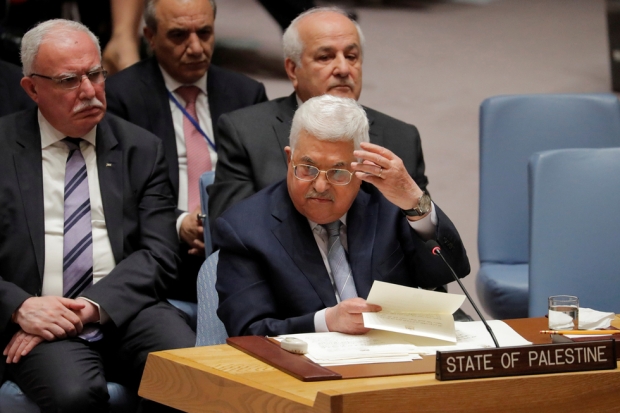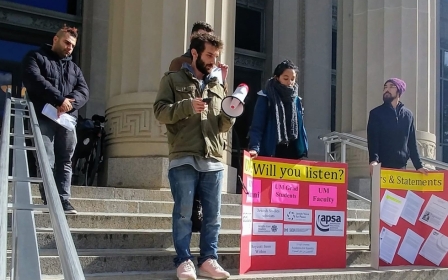Palestinian women have 'meaningful role to play', says lawyer ahead of UN address
UNITED NATIONS – Civil rights lawyer Randa Siniora will make history this week when she becomes the first Palestinian woman campaigner to address the United Nations Security Council.
Siniora, director of the Women's Center for Legal Aid and Counselling, a Palestinian rights group, will address the top UN body on Thursday during a debate on rape, trauma and other challenges faced by women in Syria, Congo, Yemen and other conflict zones.
Her address has been lauded as a rare chance for a Palestinian campaigner to speak to a global audience, especially as US President Donald Trump’s peace-making efforts in the Middle East often sideline Palestinian voices.
In an interview with Middle East Eye, Siniora said Palestinian women have not only been shot during demonstrations and stoned to death by Israeli settlers, but they are also the ones who pick up the pieces when families are torn apart.
“We’re talking about the whole range of violations compounded with the traditional roles of women in the household, which creates another layer of oppression that women have to suffer under the occupation,” Siniora told MEE.
Examples of repression
Siniora, a UK-educated lawyer from Jerusalem who has worked on legal rights for the past three decades, said she will use her time at the UN to provide envoys with concrete examples of life under Israeli occupation.
One such case is that of Mirvat, a 35-year-old Palestinian woman from Hebron, in the West Bank, who was attacked by a mob of Israeli settlers while putting out her trash in January.
The gang of young settlers beat her so badly that Mirvat, who was four months pregnant at the time, miscarried, said Siniora. Despite alerting police, Mirvat, who doesn't want her full name revealed, says no one was prosecuted for the violence.
Women bear the brunt of the hardships of Israeli colonisation and the structured patriarchy of Palestinian society
- Randa Siniora, lawyer
Others have suffered at demonstrations that have taken place across Gaza since March.
Siniora highlighted the case of Alaa, 15, who was hit in the back by an exploding bullet during a protest at the al-Bureij boundary post with Israel in July. Her injuries have left her unable to walk or sleep properly, Siniora said.
In the lead-up to the UN meeting, Siniora has also pushed for greater UN scrutiny of Israel and Palestine under a mechanism called the Informal Expert Group, but noted that the 15-member council, on which Israel’s ally, the United States, has veto powers, was unwilling to take that step.
Siniora’s criticism will be aimed not only at Israeli officials but at the male-dominated Palestinian Authority (PA), as well.
She said the PA barely includes women in the day-to-day running of the territory and it doesn't allow women near the negotiating table with foreign envoys. “Women bear the brunt of the hardships of Israeli colonisation and the structured patriarchy of Palestinian society,” she said.
Need for woman voices
Anna Tonelli, a conflict expert at global charity Oxfam International, called for greater inclusion of women in discussions on the Israeli-Palestinian conflict.
“It’s critical that women like Randa are included in this dialogue because Palestinian women continue to endure the worst impact of the Israeli occupation,” Tonelli told MEE.
“Despite their higher educational levels, they fare worse than men in the labour market, in political participation and leadership.”
Since taking power in January 2017, Trump has halted funding for Palestinian refugees, shuttered the Palestinian diplomatic outpost in Washington and recognised Jerusalem as Israel’s capital, moving the US embassy there.
That move reversed longstanding US policy, sparked global outrage, and finally, led PA President Mahmoud Abbas and his officials to boycott peace efforts led by Jared Kushner, Trump’s senior adviser and son-in-law.
Turning to UN
Palestinian officials have tried to get around the deadlocked negotiations by taking their case to the UN, with Abbas delivering impassioned speeches to the Security Council in February and the 193-nation General Assembly in September.
Abbas also announced plans to upgrade Palestine’s status at the UN to full membership and, in May, Foreign Minister Riyad al-Maliki asked International Criminal Court (ICC) prosecutors to launch a full probe into alleged Israeli abuses on Palestinian soil.
The Palestinian push for international recognition received a boost earlier this month when Palestine was elected at the UN General Assembly as chair of a group of 77 developing states, known as G77.
The resolution granting Palestine the right to be the G77 chair for 2019 was backed by 146 UN member states. Only the US, Israel and Australia voted against the measure.
Jonathan Cristol, a scholar at Adelphi University, said he was not surprised that the PA was attempting an “end run” around Washington, but that the chances of success were slim.
“The US remains the key outside player in this conflict. Maybe the other permanent Security Council members can assume a more prominent role, but ultimately the multilateral institution route will not end the occupation nor lead to full UN membership,” Cristol told MEE.
Despite these challenges, Siniora intends to take the stage at the Security Council to bring attention to critical and too-often overlooked topics: the suffering of women in war and the ways in which they can be at the forefront of positive change.
“Women have to be part of mediation, reconciliation and peace-building in our region," she said. "Across the Middle East, women have a meaningful role to play, they have to be engaged, and they can perhaps change the rules of the game.”
New MEE newsletter: Jerusalem Dispatch
Sign up to get the latest insights and analysis on Israel-Palestine, alongside Turkey Unpacked and other MEE newsletters
Middle East Eye delivers independent and unrivalled coverage and analysis of the Middle East, North Africa and beyond. To learn more about republishing this content and the associated fees, please fill out this form. More about MEE can be found here.




